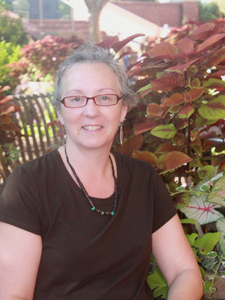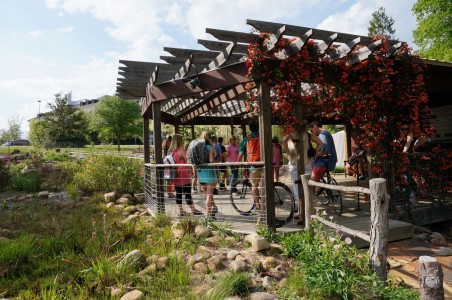Posted contributed by Taylor Kraabel, Office of Sustainability Intern
Claire Wilson began her time at Auburn as the executive assistant in the Mechanical Engineering Department. Soon after, she became the Senior Editor for the Encyclopedia of Alabama in the Office of University Outreach. Altogether, Claire has been a proud member of the Auburn family for the past 16 years.

Claire Wilson
Getting Involved with the Peers Network
Although Claire has always had an interest in sustainability, it was not until she began working in Ralph Brown Draughon Library that she decided to take on a larger role in Auburn’s transition to a more sustainable campus. Each day, she observed the massive amounts of garbage accumulated by the library. Inspired to make a change, Claire became a Peers Network Ambassador.
Since joining the Peers Network, Claire has enjoyed the training sessions and the opportunity to get to know other Auburn employees who share her passion. She dove head first into improving the library’s waste practices and learning its internal workings. After becoming more involved, Claire discovered the challenges of making systemic change at an institution as large as the library. However, she is excited about the potential for improvement.
Transforming the Library
While learning more about the RBD, Claire discovered a number of sustainability-related initiatives already in place. The library currently uses responsive lighting, which saves electricity by only coming on when people are using the room. It also reuses old furniture and recycles carpet so none of this goes to waste. Relatively recently, the library’s heating and cooling systems have also been updated, making them far more efficient.
Beyond these great strides, Claire has a few projects in mind to make the library, as well as University Outreach, even better. For instance, one of her main focuses concerns paper usage. She has promoted the “Set it and Forget it” campaign to both the RBD Library and University Outreach to switch printing to double-sided as the default setting. Claire also hopes to convince unit leaders to purchase recycled-content paper, further reducing the building’s ecological footprint. Another project she hopes to implement is battery recycling because every automatic soap dispenser, faucet, paper towel dispenser, and other bathroom fixtures are battery operated. Needless to say, the potential impact of battery recycling is more than significant.
Sustainability Challenges and Inspiring Initiatives

Students tour the bog garden at Donald E. David Arboretum.
Of the many sustainability obstacles we face today, Claire believes the most profound is single-use products. In other words, our “throw-away” mindset is perhaps the biggest hurdle we must overcome in order to truly be sustainable. However, she also recognizes myriad of ways in which Auburn is already tackling this issue.
Speaking of Auburn’s initiatives, Claire’s favorite example of sustainability around Auburn is the new bioswales in front of the Mell Classroom Building. These fixtures aid in filtering debris from rainwater runoff, which in turn helps maintain a clean local water supply. She also enjoys the demonstration gardens located in the Donald E. Davis Arboretum. These gardens serve as a model for proper horticulture practices and encourage community members to develop their own green thumbs. All in all, Claire is excited for the sustainability projects this coming year brings to both the library and Auburn University as a whole.




